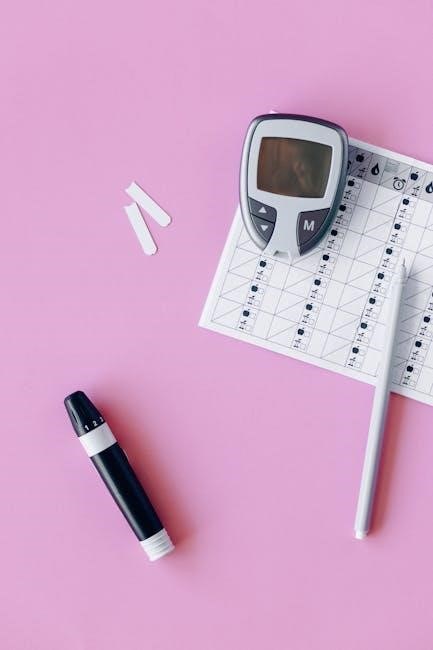1.1 Overview of the Blood Type Diet Concept
The Blood Type B Positive Diet focuses on tailored nutrition to improve health, weight management, and energy levels by aligning food choices with genetic ancestry.
The Blood Type Diet, developed by Dr. Peter D’Adamo, suggests that individuals with Blood Type B Positive should consume foods that align with their genetic makeup. This diet emphasizes lean meats, low-fat dairy, and certain vegetables, while avoiding grains like corn and buckwheat. It aims to optimize health, energy, and weight management by catering to the unique metabolic needs of Blood Type B Positive individuals, promoting a balanced and tailored nutritional approach.
1.2 Importance of Tailored Nutrition for Blood Type B Positive
Tailored nutrition for Blood Type B Positive individuals is crucial for enhancing metabolic efficiency, preventing health issues, and boosting energy levels. By aligning dietary choices with genetic traits, this approach helps optimize digestion, reduce inflammation, and support immune function. The Blood Type B Positive Diet emphasizes lean proteins, vegetables, and low-fat dairy while avoiding inflammatory grains and legumes, promoting a balanced and personalized eating plan for long-term well-being.

Understanding Blood Type B Positive Characteristics
Blood Type B Positive individuals have unique genetic traits influenced by ancestral diets, adapting to diverse food sources, which shapes their metabolic and digestive tendencies.
2.1 Genetic Traits and Ancestral Dietary Influences
Blood Type B Positive individuals possess genetic adaptability, influenced by nomadic ancestors who consumed diverse diets. This ancestry allows for efficient metabolism of a wide variety of foods, including meats, dairy, and plants. The ability to thrive on both animal and plant-based diets reflects their evolutionary flexibility, making them well-suited for balanced nutrition. This genetic diversity enables Blood Type B Positive individuals to avoid inflammatory responses to most foods, promoting overall health and energy levels when adhering to tailored dietary practices.
2.2 Metabolic and Digestive Features of Blood Type B Positive
Blood Type B Positive individuals typically exhibit efficient metabolism and robust digestion, allowing them to process a wide variety of foods effectively. Their digestive system is well-suited for breaking down proteins, fats, and carbohydrates, making them adaptable to diverse diets. However, they may face challenges with weight gain if consuming excessive processed foods or certain grains. A balanced diet emphasizing lean meats, fish, and vegetables helps maintain optimal metabolic function and prevents digestive discomfort.
2;3 Common Health Challenges and Dietary Solutions
Individuals with Blood Type B Positive may face health challenges such as autoimmune diseases, obesity, and digestive issues if their diet is not properly aligned. To address these, focusing on lean meats, fish, and vegetables is crucial. Avoiding inflammatory foods like corn, buckwheat, and tomatoes can help prevent weight gain and improve overall health. Incorporating low-fat dairy and avoiding harmful grains and legumes further supports digestive well-being and metabolic balance, promoting a healthier lifestyle tailored to their blood type.
Recommended Food Categories for Blood Type B Positive
Focus on high-quality proteins, leafy greens, fruits, whole grains, and select dairy products. These categories support metabolism, digestion, and overall health for Blood Type B Positive individuals.
3.1 Benefits of High-Quality Proteins
High-quality proteins, such as lean meats, fish, and eggs, are essential for Blood Type B Positive individuals. They support muscle repair, satisfy hunger, and promote metabolic efficiency. Protein-rich foods like beef, chicken, and turkey are recommended for their ability to enhance energy levels and maintain weight management. Additionally, plant-based proteins like beans and tofu can be beneficial, offering balanced nutrition without causing inflammation. Incorporating these proteins ensures optimal health and digestion for Blood Type B Positive individuals.
3.2 Importance of Leafy Greens and Vegetables
Leafy greens and vegetables are vital for Blood Type B Positive individuals, providing essential vitamins, minerals, and antioxidants. They support immune function, digestion, and overall health. Leafy greens like spinach, kale, and broccoli are rich in iron and calcium, promoting healthy blood cells and bone strength. Incorporating a variety of vegetables ensures a balanced diet and helps prevent nutrient deficiencies. These foods are also low in calories and high in fiber, aiding in weight management and maintaining energy levels throughout the day.
3.3 Role of Fruits in Maintaining Nutritional Balance
Fruits play a crucial role in the Blood Type B Positive Diet by providing essential vitamins, antioxidants, and fiber. They help maintain immune function, support digestive health, and regulate blood sugar levels. Apples, grapes, and tomatoes are recommended for their high nutrient content and ability to enhance overall well-being. Incorporating a variety of fruits ensures a balanced intake of natural sugars and energy-boosting compounds, making them a vital part of a healthy diet for Blood Type B Positive individuals.
3.4 Whole Grains and Their Impact on Digestion
Whole grains are a beneficial category for Blood Type B Positive individuals, offering sustained energy and digestive support. Oats, quinoa, and rice are excellent choices, as they are easy to digest and rich in fiber. These grains help maintain a healthy gut, preventing bloating and indigestion. Incorporating whole grains into meals ensures a steady supply of nutrients and supports overall digestive well-being, making them a key component of the Blood Type B Positive diet for optimal health and energy balance.
3.5 Dairy Products and Their Benefits for Blood Type B Positive
Dairy products are highly beneficial for Blood Type B Positive individuals, as they support digestion and provide essential nutrients. Low-fat options like milk, yogurt, and cheese are ideal, while eggs are also recommended. These foods promote a healthy metabolism and help prevent autoimmune issues. Incorporating moderate amounts of dairy enhances overall well-being and supports the body’s natural functions, making them a cornerstone of the Blood Type B Positive diet for maintaining energy and vitality.

Food List for Blood Type B Positive Individuals
This comprehensive list outlines optimal food choices for Blood Type B Positive individuals, promoting health and weight management through tailored dietary recommendations.
4.1 Meat and Poultry Recommendations
For Blood Type B Positive individuals, lean meats like lamb, venison, and turkey are highly recommended. These options promote better digestion and energy levels. Avoid chicken and pork, as they may cause inflammation. Opt for grass-fed or organic choices to maximize nutritional benefits. Incorporating these meats into meals helps maintain a balanced diet and supports overall health and weight management.
4.2 Fish and Seafood Options
Fatty fish like salmon, mackerel, and halibut are excellent for Blood Type B Positive individuals, offering omega-3 fatty acids that support heart health and reduce inflammation. Cod, sardines, and trout are also beneficial. Avoid shellfish such as shrimp, crab, lobster, and mussels, as they may trigger adverse reactions. Wild-caught fish are preferable to farmed options for better nutrient profiles. Incorporating these fish and seafood into meals enhances overall well-being and supports a balanced diet tailored to Blood Type B Positive needs.
4.3 Vegetables to Include in the Diet
Leafy greens like spinach, kale, and collard greens are highly beneficial for Blood Type B Positive individuals, supporting metabolism and digestion. Cruciferous vegetables such as broccoli, cauliflower, and Brussels sprouts are also recommended for their nutrient-dense properties. Sweet potatoes, carrots, and beets provide essential vitamins and minerals. Avoid tomatoes, corn, and peppers, as they can cause inflammation. Incorporating a variety of vegetables ensures a balanced and nutritious diet tailored to Blood Type B Positive needs, promoting overall health and well-being.
4.4 Fruits That Are Beneficial
Fruits like apples, grapes, bananas, and pineapple are highly beneficial for Blood Type B Positive individuals, providing essential vitamins and antioxidants. Berries such as blueberries and strawberries support immune function, while cherries and plums aid digestion. Avoid citrus fruits and tropical varieties like mangoes, as they may trigger inflammation. Incorporating a variety of these fruits ensures a balanced intake of nutrients, supporting overall health and energy levels for Blood Type B Positive individuals.
4.5 Grains and Legumes Suitable for Blood Type B Positive
Whole grains like rice, oats, and barley are ideal for Blood Type B Positive individuals, as they promote digestion and provide sustained energy. Legumes such as green beans and peas are also beneficial; These foods are rich in fiber and nutrients, supporting overall health. Avoid grains and legumes that cause inflammation, such as corn and sesame seeds, as they can hinder metabolic efficiency. Incorporating these grains and legumes helps maintain a balanced and nutritious diet.
4.6 Dairy Products and Alternatives
Dairy products are highly beneficial for Blood Type B Positive individuals, as they provide essential nutrients and support digestion. Low-fat dairy options like milk, yogurt, and cheese are ideal. These foods are rich in calcium and protein, promoting bone health and energy levels. Moderate consumption of cheeses like cheddar and Parmesan is recommended. Plant-based alternatives, such as almond and soy milk, are suitable for those with lactose intolerance. Incorporating these dairy products and alternatives enhances the overall nutritional balance of the diet.
4.7 Healthy Fats and Oils
Healthy fats and oils are essential for Blood Type B Positive individuals to maintain heart health and support digestion. Olive oil is highly recommended for its antioxidant properties and versatility in cooking. Avocado oil and flaxseed oil are also beneficial, providing omega-3 fatty acids and promoting balanced cholesterol levels. These fats enhance nutrient absorption and contribute to overall well-being. Incorporating these oils in moderation ensures a balanced and nutritious diet tailored to Blood Type B Positive needs.
4.8 Herbs and Spices to Enhance Flavors and Health
Herbs and spices play a crucial role in enhancing flavors and promoting health for Blood Type B Positive individuals. Turmeric, ginger, and cumin are excellent choices due to their anti-inflammatory properties. Garlic supports immune function, while parsley and dill aid digestion. Avoid spices like chili peppers, which may cause inflammation. Incorporating these herbs and spices not only elevates meal flavors but also supports overall well-being, aligning with the dietary needs of Blood Type B Positive individuals.

Foods to Avoid for Blood Type B Positive
Certain vegetables and fruits, such as tomatoes and corn, should be avoided as they may cause inflammation and weight gain, hindering overall health for Blood Type B Positive individuals.
5.1 Inflammatory Grains and Legumes
Certain grains and legumes, like wheat, corn, buckwheat, lentils, and peanuts, can trigger inflammation in Blood Type B Positive individuals. These foods may cause digestive discomfort and weight gain due to their lectin content, which can interfere with proper nutrient absorption. Avoiding these inflammatory options helps maintain metabolic balance and overall health. Opting for alternatives like quinoa and millet can provide similar nutritional benefits without the adverse effects. Incorporating herbs and spices can also enhance flavor without relying on inflammatory ingredients.
5.2 Avoiding Certain Vegetables and Fruits
Certain vegetables like tomatoes, peppers, and corn can cause inflammation and digestive issues for Blood Type B Positive individuals. Similarly, some fruits, such as tropical varieties like mangoes and papayas, may not be ideal due to their lectin content. These foods can interfere with proper digestion and metabolic function, potentially leading to weight gain and energy loss. Opting for more compatible options, such as green vegetables and berries, helps maintain balance and supports overall health.
5.3 Reducing Consumption of Specific Meats
For Blood Type B Positive individuals, certain meats like chicken, pork, and processed meats should be consumed in moderation or avoided. These meats can contain lectins that may trigger inflammation and weight gain. Reducing intake of these meats helps maintain digestive health and supports metabolism. Opting for leaner, more compatible options like turkey, lamb, or venison can provide essential proteins without adverse effects, ensuring better energy levels and overall well-being.
5.4 Limiting Dairy Products That Can Cause Discomfort
While dairy products can be beneficial for Blood Type B Positive individuals, some may cause discomfort. Processed cheeses and high-fat dairy products should be consumed in moderation. Ice cream and excessive cream intake can lead to inflammation and digestive issues. Opting for unprocessed, low-fat dairy options like cottage cheese, yogurt, or milk from grass-fed cows can help avoid discomfort while still providing essential nutrients and supporting overall health.
5.5 Avoiding Harmful Fats and Oils
Harmful fats and oils, such as hydrogenated oils and palm oil, can disrupt digestion and metabolism for Blood Type B Positive individuals. These oils often trigger inflammation and weight gain. Coconut oil and certain processed vegetable oils should also be avoided, as they can slow down metabolic functions. Instead, opt for healthier options like olive oil and avocado oil, which support digestion and overall well-being without causing adverse reactions.

Tips for Meal Planning and Grocery Shopping
Plan balanced meals, create smart shopping lists, and prepare in advance to maintain a healthy Blood Type B Positive diet and avoid harmful foods effectively.
6.1 Structuring Balanced Meals
Structuring balanced meals for Blood Type B Positive involves combining lean proteins like fish or turkey with leafy greens, whole grains, and beneficial fruits. Incorporate foods rich in kaempferol, such as apples and green tea, to enhance health benefits. Avoid inflammatory grains and legumes, focusing on gluten-free options like rice or quinoa. Pair meals with healthy fats like olive oil to support digestion and metabolism. Ensure variety and portion control to maintain nutritional balance and avoid weight gain-inducing foods.
6.2 Smart Grocery Shopping Strategies
Smart grocery shopping for Blood Type B Positive involves prioritizing fresh, whole foods and avoiding inflammatory items. Create a shopping list based on your food list PDF to stay focused. Opt for lean meats, fish, and dairy products, along with a variety of vegetables and fruits. Avoid processed foods and grains like corn and wheat. Check labels for harmful additives and opt for organic or locally sourced options when possible. Plan meals in advance to avoid impulse purchases and ensure nutritional balance.
6.3 Preparing Meals in Advance
Preparing meals in advance is essential for maintaining the Blood Type B Positive Diet. Plan weekly meals using your food list PDF, ensuring each dish aligns with recommended foods. Cook proteins like lean meats and fish in bulk, and pre-chop vegetables for quick assembly. Avoid last-minute choices that may include harmful foods. Store pre-portioned meals to stay organized and committed to your dietary goals. This approach supports weight management, energy levels, and overall health consistency.
Weight Management and the Blood Type B Positive Diet
The Blood Type B Positive Diet supports weight management by balancing metabolism, incorporating lean proteins, and avoiding inflammatory foods like corn and buckwheat to maintain a healthy weight naturally.
7.1 Foods That Promote Weight Loss
Foods like lean meats, fish, and eggs support weight loss by stabilizing blood sugar and boosting metabolism. Leafy greens and cruciferous vegetables, such as spinach and broccoli, are rich in nutrients and fiber, aiding digestion and satiety. Whole grains like quinoa and oatmeal provide sustained energy without causing inflammation. Incorporating these foods helps maintain a balanced diet, promoting gradual and healthy weight loss while aligning with the Blood Type B Positive dietary recommendations.
7.2 Avoiding Weight Gain-Inducing Foods
For Blood Type B Positive individuals, avoiding certain foods is crucial to prevent weight gain. Inflammatory grains like corn, buckwheat, and wheat, as well as legumes such as lentils, should be limited. Tomatoes, peanuts, and sesame seeds can also contribute to weight gain. These foods may slow metabolism and cause bloating; Additionally, avoiding dairy products that cause discomfort, such as processed cheeses, can help maintain a healthy weight. Choosing the right foods ensures better digestion and metabolic balance.
7.3 Maintaining a Healthy Metabolism
Maintaining a healthy metabolism for Blood Type B Positive individuals involves balancing nutrient-rich foods that enhance digestion and energy production. Incorporating lean proteins like turkey, fish, and eggs supports metabolic function. Leafy greens, such as spinach and kale, provide essential vitamins and minerals. Whole grains like oats and quinoa aid in steady energy release. Avoiding inflammatory foods like corn and buckwheat helps prevent metabolic slowdown. Staying hydrated and managing portion sizes further support a balanced and efficient metabolism, promoting overall well-being and vitality.
The Role of Supplements in the Blood Type B Positive Diet
Supplements like vitamin D and magnesium support immune function and digestion for B Positive individuals, addressing potential deficiencies while enhancing overall well-being naturally and safely.
8.1 Essential Vitamins and Minerals
For Blood Type B Positive individuals, essential vitamins like vitamin D and B12 support immune function and energy production. Magnesium aids digestion, while iron prevents anemia. Folate and zinc enhance metabolic balance and immune health. These nutrients can be sourced from lean meats, leafy greens, and fortified cereals. Ensuring adequate intake of these vitamins and minerals helps maintain overall well-being and supports the body’s natural processes effectively without causing deficiencies or imbalances.
8.2 Herbal Supplements for Enhanced Health
Herbal supplements can enhance the benefits of the Blood Type B Positive Diet. Ginger supports digestion, while turmeric reduces inflammation. Echinacea boosts immunity, and green tea aids in weight management. These herbs align with the diet’s principles, promoting overall well-being. Incorporating them can complement nutrient intake and support metabolic balance. Always consult a healthcare provider before adding new supplements to ensure they suit your specific health needs and dietary goals.
8.3 Avoiding Harmful Supplements
Certain supplements can negatively impact individuals with Blood Type B Positive. Echinacea, for instance, may trigger immune system issues. High-estrogen supplements, like those containing excessive soy isoflavones, can disrupt hormonal balance. Additionally, some multivitamins containing high levels of vitamin E or iron may cause digestive discomfort. St. John’s Wort, while beneficial for others, can interfere with metabolism in Blood Type B individuals. Always review ingredient lists and consult a healthcare professional before adding new supplements to your regimen.
Scientific Evidence and Criticisms of the Blood Type Diet
The Blood Type Diet lacks rigorous scientific validation, with critics arguing that its benefits are anecdotal rather than evidence-based. Limited research supports its claims, leading to debate in the medical community about its universal applicability and effectiveness for all individuals, including those with Blood Type B Positive.
9.1 Research Supporting the Blood Type Diet
Some studies suggest that the Blood Type Diet may offer benefits for weight management and metabolic health. Blood Type B Positive individuals may experience improved digestion and reduced inflammation when adhering to the recommended food list. Proponents argue that aligning diet with blood type aligns with ancestral eating patterns, which can enhance overall well-being. While not universally accepted, some clinical trials indicate positive outcomes for blood type-specific diets, though more research is needed for definitive conclusions.
9.2 Criticisms and Lack of Scientific Consensus
The Blood Type Diet has faced criticism for lacking robust scientific evidence. Many studies are small or anecdotal, and critics argue that no conclusive research proves its effectiveness. Some experts question the diet’s universal applicability, as individual responses to foods vary widely. While some people report benefits, the absence of large-scale, peer-reviewed trials means the diet remains controversial within the scientific community. Critics emphasize that dietary needs are highly individual and not solely determined by blood type.
9.3 Balancing Personal Experience with Scientific Evidence
While the Blood Type Diet lacks comprehensive scientific support, many individuals report positive health outcomes. Balancing personal experience with evidence is key. Some find improved digestion or weight loss, suggesting potential benefits despite the lack of rigorous trials. It’s essential to consider both anecdotal success and scientific skepticism. Consulting a healthcare professional can help integrate the diet into a personalized plan, ensuring it aligns with overall health goals and doesn’t overlook nutritional needs or potential risks.
Creating a Blood Type B Positive Diet PDF Food List
A Blood Type B Positive Diet PDF food list helps organize dietary recommendations, making it easy to reference. Include high-quality images, portion sizes, and meal ideas for convenience.
10.1 Organizing the Food List for Easy Reference
Organizing a Blood Type B Positive Diet PDF food list involves categorizing foods into clear sections like proteins, vegetables, and grains. Use bullet points or icons for readability. Include high-quality images of foods to aid recognition. Add color-coding or bold text to highlight beneficial or avoidable items. Ensure the list is alphabetized or grouped by meal types for quick access. Include a search function or index for easy navigation, making it user-friendly for daily meal planning and grocery shopping.
10.2 Including Portion Sizes and Meal Ideas
Incorporate portion sizes to guide daily intake, such as 3-4 ounces for proteins and 1/2 cup for grains. Add meal ideas like breakfast options (eggs, toast), lunch (grilled chicken salad), and snacks (fresh fruits). Provide balanced combinations, ensuring a mix of proteins, vegetables, and whole grains. Include tips for adjusting portions based on activity levels and dietary goals. Use icons or images to visually enhance the meal ideas, making the PDF both practical and visually appealing for easy adherence to the diet plan.
10.3 Customizing the List Based on Personal Preferences
Allow individuals to tailor the Blood Type B Positive Diet food list to their preferences by offering flexible options within recommended categories. For example, swap lean meats with fish or choose plant-based proteins. Include notes for preferences like vegetarian or low-carb diets. Add checkboxes or space for personal notes to track favorites or avoidances. This ensures the list remains practical and enjoyable, fostering long-term adherence to the dietary plan while respecting individual tastes and lifestyle demands.



